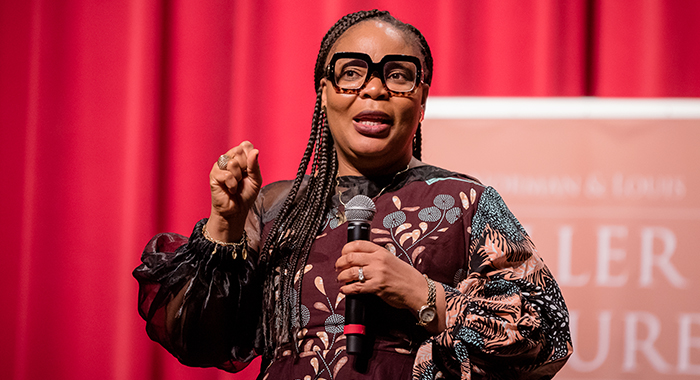Nobel Laureate Delivers Message of Peace and Power at Miller Series Event on Campus
Nobel laureate and peace activist Leymah Gbowee delivered a stirring message of peace, power and righteous anger when she visited campus last month to give the April 12 Norman & Louis Miller Lecture in Public Understanding.
Those mentoring young people, she told her Walter Theatre audience, need to help them channel their anger at injustice into a space where it can be used for the greater good of humanity.
Gbowee, who led the interfaith women’s coalition that helped to end the second Liberian Civil War, said: “Let me see the angry young people in this room.” The challenge was followed by a demonstration of the case for non-violence. “Anger is like this, it’s fluid,” Gbowee said, shaking her water bottle. “It’s neither good nor bad. What we have when we’re angry, we have two containers in front of us, the violent and the non-violent containers. Depending how and where you pour your anger, you leave a legacy, either as a villain or a hero. Hitler poured his and we know history; Ghandi poured his and we know history.”
Mentorship and empowerment is now an increasing part of Gbowee's work. “Never walk on tippy toes,” she told the handful of children in the audience, slipping off her smart black pumps to demonstrate. “If you walk on tippy toes you don’t leave prints, so no one really knows you passed here. Leave large prints so that whoever comes behind you will know that you walked. Those prints that you’re leaving, leave it for good.”
Her other rule for young people is: “Your voice is your power.” She described her empowerment process as: “I don’t speak for young people; I pass the mic. First bring young people into the room, help them understand the room and gradually give them the freedom to make their mistakes. The problem for us as adults, we made our mistakes and now we’re too jittery to let young people make their mistakes. I’m praying not to be one of those people because I made a lot of mistakes but I’m still standing.”
Gbowee recalls suffering from low self-esteem when she first returned to Liberia with her three children after living as a refugee in Ghana. She went to Mother Patern College of Health Sciences in Monrovia to study for a first degree in social work. She was angry that her professor had given her an F grade without reading her paper, because she had never spoken in class. (She was later given an A.) “Don’t ever be silent and allow people to judge you on the basis of your silence.”
Her path to peace activism continued alongside her studies, working with the Trauma Healing & Reconcilation Program based at St. Peter’s Lutheran Church in Monrovia. This (plus a masters in Conflict Transformation) led to her work in rehabilitating former child soldiers and the founding of the non-violent women’s peace movement, Women of Liberia Mass Action for Peace, which helped to end the Second Liberian Civil War of 2003.
A long anticipated opportunity for SNC audiences
Gbowee was originally scheduled to visit campus to give the Fall 2020 Norman & Louis Miller Lecture in Public Understanding. Instead, a virtual lecture by the Nobel laureate, broadcast in the middle of the night from Ghana, helped the SNC community through the early days of the pandemic.
In preparation for her Miller Lecture last month, the Norman Miller Center had screened Abigail Disney’s documentary “Pray the Devil Back to Hell,” which tells the story of the nonviolent, strategic and powerful action of the women’s movement that Gbowee founded. That initiative culminated in the exile and arrest of Charles Taylor and the democratic election of Africa’s first female head of state, Ellen Johnson Sirleaf.
The documentary was also shared with faculty to show to students, and is a part of first-year course on human rights taught by Miller Center director Bob Pyne. In fact, For more than a decade, Gbowee’s image has been part of the Miller Center wall collage on elements of Catholic Social Teaching, representing "Rights and Responsibilities."
“When we spoke by Zoom a year and a half ago, I told Ms. Leymah we were ready for a new picture,” Pyne told the April 12 audience when he introduced the speaker. “Her human rights advocacy did not stop with Liberia’s free democratic elections in 2005, and her work has expanded greatly since the Nobel Peace Prize. She has inspired activist passion across the globe, for example with Women Wage Peace in Israel and the West Bank.
“The last time we had a Nobel Prize winner here for the Miller Lecture, it was in 1999 with Elie Wiesel. While he was speaking, the civil war was tearing apart Liberia, and Leymah Gbowee was a young social worker and mother, starting to mobilize other women in a movement for peace. Tonight, while she speaks to us, Russian tanks are ripping through Ukraine, refugees are on the move, and God knows we need another generation of peacebuilders.
If there is anyone who deserves to rest on their laurels, it’s a Nobel laureate. But far better, in a world filled with pain, to be a healer. Far better, in a world filled with injustice, to be one in whom the fire still burns.”
A message for the future
Program coordinator Jill Olson (Miller Center), commmenting after the event, said she really connected with Gbowee's mission to counsel future peacemakers. Two of the youngest members of the audience were Sara and Citali Saavedra Estrada, children of SNC faculty member Angel Saavedra Cisneros (Political Science). The girls said Gbowee’s stories showed that anyone can do anything. Sara, 14, asked, how do you respond when people think you’re weak because of your past experiences. Gbowee’s answer: Don’t let other people judge you by your silence.
April 27, 2022












